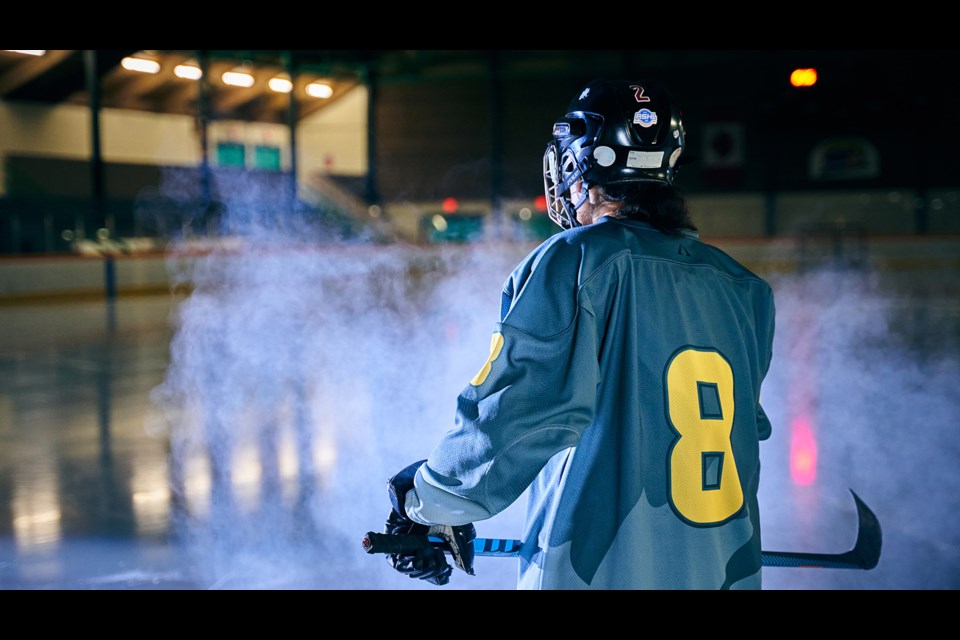As a 61-year-old, Asian Canadian woman, Kelley Lee-Gilmore says she's the last person people imagine when they think of a hockey player, so when her daughter made a documentary about her 55+ women’s hockey team – complete with epic, slow-motion shots of her skating solo in an empty rink with a smoke machine – it wasn't just cool, it was emotional.
"It was so empowering," said Kelley, a Burnaby resident and SFU health sciences professor. "If you were going to create my dream on ice, it would have been that."
The documentary, titled Overtime, was written and directed by filmmaker Jenny Lee-Gilmore and is available online and on Telus Optik TV Channel 8 today (Dec. 5).
The film premiered at the Calgary International Film Festival and scooped up awards at the Vancouver Asian Film Festival last month for best short documentary, best direction in a short documentary and best cinematography in a short documentary.
Mom and daughter took time out last week to talk to the NOW about the project.
'I loved the aggression'
The film explores Kelley's lifelong passion for hockey against the backdrop of the Canada 55+ Games in Kamloops, where her team, the B.C. Wolfpack, takes on opponents from across the country.
"I just thought, wow, what a unique, interesting opportunity to have this group of women of a certain age and also tell my mom's story of how she loves hockey and how she got to where she is," Jenny said.
A graduate of UBC's film production program, Jenny is passionate about telling female-centric and Asian Canadian stories overlooked or neglected by mainstream media.
The role hockey has played in her family certainly doesn't fit the stereotypical mould.
People are surprised when they find out Jenny plays hockey, she said, and even more surprised when they find out it was her mom who taught her to play.
Kelley's passion for the sport was sparked in elementary school in East Vancouver the day her teacher wheeled a TV into the classroom so the class could watch the Canada-Russia series in 1972.
"As an Asian girl, you're not really supposed to be very aggressive, but I just connected with that. I loved the aggression of the game and the feistiness of it," she said.
But her family wasn't into sports, and there wasn't a lot of money to go around, so she didn't get a chance to play until she finished high school and could pay her own fees in the early 1980s.
'A little piece of Canada'
Her first team was the Kitsilano Kanakas, where she played for a few years until moving to Brighton, England for graduate studies.
She thought she was leaving her hockey days behind but, surprisingly, found a women's "ice" hockey league in her adopted country.
"They were just beginning," Kelley said of the women's hockey scene in England. "I remember one game I scored eight goals."
During her 25 years in England, she married an Englishman, Andrew Gilmore, and had two kids, Jenny and Alex, all of whom she got into hockey – eventually.
"It was a little piece of Canada that I really wanted them to experience, so it has special memories for us," she said.
For Jenny, hockey was a way to connect with her busy mom.
"We'd spend hours at the rink on our summer holiday," she said. "I remember watching her games and thinking, 'This is so cool.' I remember my friends thinking she was cool."
Eventually, however, something in Kelley's busy life had to give, and she gave up the game for 17 years.
Today (the family moved to Canada in 2010), she plays in a 40+ women’s division she started last year at the Scotia Barn as well as on a 19+ team. She also subs on other teams when she can.
Challenging stereotypes
People don’t associate older women, especially older Asian women, with competitive sports, Kelley said, and her daughter’s film challenges that stereotype.
Overtime also challenges people to see hockey differently, according to Kelley.
“Hockey’s far more diverse than what we see on TV,” she said.
While Jenny grew up knowing her mom loved hockey, she said making the film gave her a chance to find out more about where that passion came from and more about her mom as a person.
“There’s a lot of questions I’ve never asked before and that we got to capture on set,” Jenny said.
For her, the best part of making the film has been watching audiences connect with it – starting with her mom, who was the first to see the finished product.
“The most important thing is I wanted my mom to like the film,” Jenny said. “I remember the first time playing it for her. She was very quiet, and I was like, ‘What does this mean?’ and then she asked to see it again, so she watched it for a second time straightaway.”
The film-making process was an emotional one for the two women – and for the crew, many of whom had been in the UBC film program with Jenny and have worked with her before.
“I think a lot of them are empaths, so as soon as my mom started to feel emotional, we’re all crying behind the camera, trying not to shake the camera,” Jenny said with a laugh.
The film tells a personal story, she said, but has resonated “quite universally” with audiences so far.
“I’m very proud of that,” she said.
‘A real gift’
Kelley, meanwhile, will never forget connecting with her daughter while the cameras rolled – or the day in the empty rink with the smoke machine, skating around with an on-ice cameraman her daughter hired who had just finished filming Edmonton Oilers superstar Connor McDavid in a similar shoot.
“It was a real gift from her to do this film, and I’m very grateful for that,” Kelley said.
Follow Cornelia Naylor on Twitter @CorNaylor
Email [email protected]



